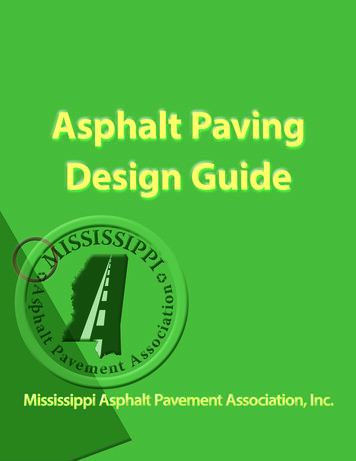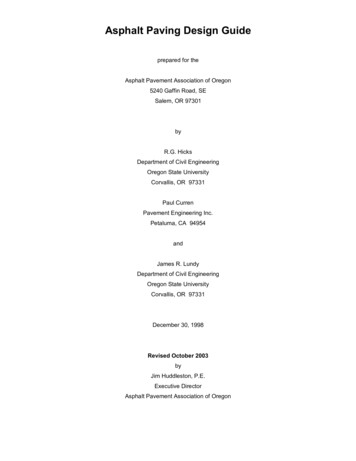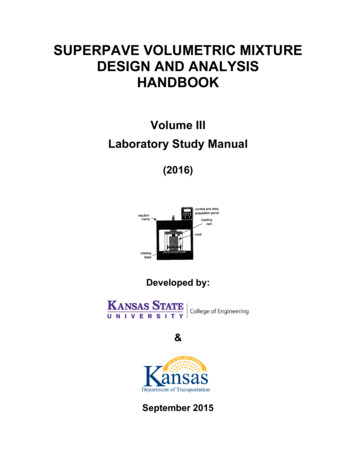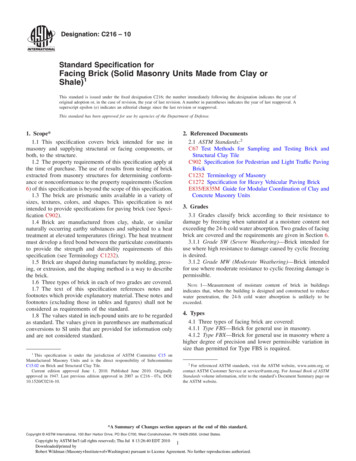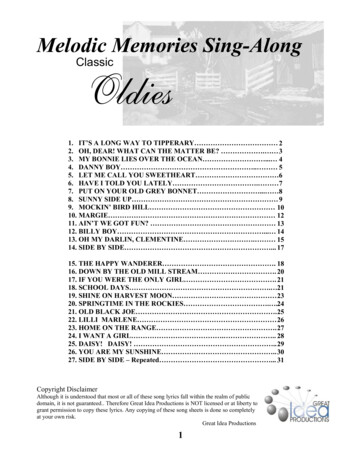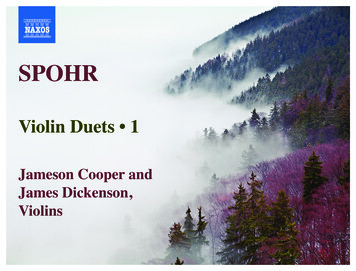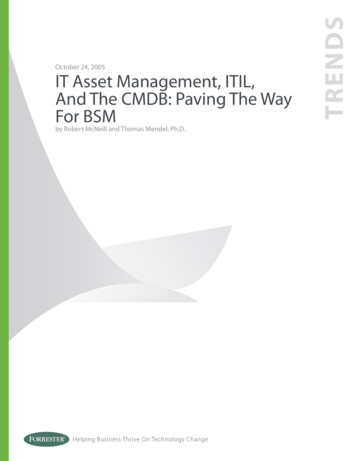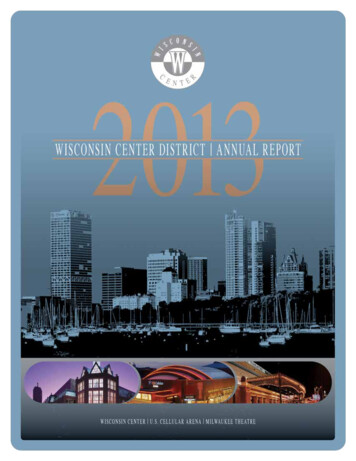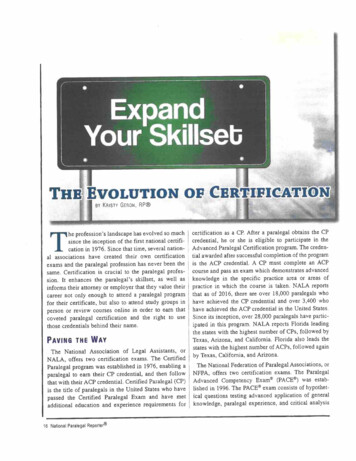
Transcription
BY KRISTY GERON,RP he profession's landscape has evolved so muchsince the inception of the first national certification in 1976. Since that time, several national associations have created their own certificationexams and the paralegal profession has never been thesame. Certification is crucial to the paralegal profession. It enhances the paralegal 's skillset, as well asinforms their attorney or employer that they value theircareer not only enough to attend a paralegal programfor their certificate, but also to attend study groups inperson or review courses online in order to earn thatcoveted paralegal certification and the right to usethose credentials behind their name.TPAVING THE WAYThe National Association of Legal Assistants, orNALA, offers two certification exams. The CertifiedParalegal program was established in 1976, enabling aparalegal to earn their CP credential, and then followthat with their ACP credential. Certified Paralegal (CP)is the title of paralegals in the United States who havepassed the Certified Paralegal Exam and have metadditional education and experience requirements for16 National Paralegal Reporter certification as a CP. After a paralegal obtains the CPcredential, he or she is eligible to participate in .theAdvanced Paralegal Certification program. The credential awarded after successful completion of the programis the ACP credential. A CP must complete an ACPcourse and pass an exam which demonstrates advancedknowledge in the specific practice area or areas ofpractice in which the course is taken. NALA reportsthat as of 2016, there are over 18,000 paralegals whohave achieved the CP credential and over 3,400 whohave achieved the ACP credential in the United States.Since its inception, over 28,000 paralegals have participated in this program. NALA reports Florida leadingthe states with the highest number of CPs, followed byTexas, Arizona, and California. Florida also leads thestates with the highest number of ACPs, followed againby Texas, California, and Arizona.The National Federation of Paralegal Associations, orNFPA, offers two certification exams. The ParalegalAdvanced Competency Exam (PACE ) was established in 1996. The PACE exam consists of hypothetical questions testing advanced application of generalknowledge, paralegal experience, and critical analysis
The Evolution of Certificationobtained only by a higher level of education and actualwork experience. NFPA's Paralegal CORE CompetencyExam (PCCE ) was established in 2011. The ParalegalCORE Competency Exam TM (PCCE ) was developedto assess the knowledge, skillsand ability of early-career andentry-level paralegals. A paralegal who completes the certification process through NFPAearns the credential PACERegistered Paralegal (RP ) forcompletion of the PACE Examand Core Registered Paralegal TM(CORE , CRPTM ) for completion of the PCCE Exam. Thequestions for the exam were written by paralegal educators and experienced NFPA paralegals. Many ofthose paralegals have gone on to hold leadership andBoard positions within NFPA and their local associations. As of March 2017, NFPA reports over 323 CRPsand over 593 RPs, totaling over 900 paralegals possessing NFPA credentials. Of those paralegals, NFPAreports 8 of them are dual-credentialed with the NFPAdesignations of both CRP and RP. This number ofNFPA dual-credentialed paralegals isexpected to increase as CRPs arereadying themselves to sit for theadvanced PACE exam to earn the RPcredential. Washington State leadswith the highest total number of NFPAcertified paralegals, followed byFlorida and Texas. Florida has thehighest number of RPs, followed byWashington and Minnesota. Texas andWashington State have the highestnumber of CRPs, followed by Florida.The American BarAssociation does recognize the nationalcertifications, as wellas .LBThe Association for Legal Professionals, or NALS,previously National Association of Legal Secretaries,offers the Professional Paralegal Exam established in2004. A paralegal who completes the certification pro-LitigationBids.comThe Online Litigation Support Marketplace100% FREEFor Legal ProfessionalsWe've made connecting with litigation supportvendors easier than ever before!How It Works[?StepQI.PlStep 2: Review vendor bids & profiles. 1:Submit your case needs anonymously.Step a: Communicate with your vendorsthrough the site or app.Step 4: Choose your vendor and close yourcase.Gel Started: www.litigatinnbids.com/nfpaLB RewardsLB Rewards is acustomer loyalty programcreated to reward ourfantastic legalprofessional customersfor posting their work onLitigationBids.com It's Just A Better Way of Doing BusinessSUMMER 2017 17
The Evolution of Certificationcess through NALS earns the credential ProfessionalParalegal (PP). The Certified PP designation is receivedafter passing a one-day, four-part examination, and wasdeveloped at the request of its members. NALS reportsapproximately 203 PPs, with the highest number ofthose in Michigan, followed by Texas, Nevada, andWashington State.The American Alliance of Paralegals (AAPI) awardsthe designation American Alliance Certified Paralegal(AACP). AAPI reports approximately 74 AACPs, withthe highest number of AACPs in Ohio, followed byTexas and California.The American Bar Association does recognize thenational certifications, as well as the voluntary statespecific certifications. Several state bars have their ownparalegal certification programs, such as NorthCarolina, Ohio and Texas, and paralegals can earn thecertification credential for various specialty areas, suchDiscountedas family law, civil litigation, personal injury, or familylaw. State bars and paralegal associations may alsooffer voluntary registration once a paralegal is certifiedor when a paralegal has met minimum standards.Florida offers a voluntary registration program throughthe Florida Bar, and paralegals that choose to registerwith the Florida Bar may use the Florida RegisteredParalegal (FRP) credential after their name. Indianaoffers a similar voluntary registration program throughits state bar and a paralegal that registers is known asan Indiana Registered Paralegal (IRP). Minnesotaoffers a voluntary registration program as well; a paralegal that registers in this program is known as aMinnesota Certified Paralegal (MnCP).As of September 1, 2012, Washington State offers theLimited License Legal Technician (LLLT) program,and other states, such as Oregon and California, areconsidering and/or implementing similar programs.The LLLT program was born out of a need to offerequal access to justice for those who could notafford to hire an attorney to represent them.According to WSBA's website, they are currentlytrained and licensed to advise and assist peoplegoing through divorce, child custody and otherSubscription Ollerfamily-law matters, and are able to consult andFor non-membersadvise, complete and file necessary court documents, and help with court scheduling. Currently,there are 20 LLLTs listed in the Washington Statearea.WHY CERTIFICATION MATTERS Premier Magazine Insightful Articles Updates on Legal Matters 15 for 4 Digital Issues Students Only 20 for 4 Digital Issues Non-Students 25 Combined Print/Digital IssuesNFPA members enjoy a subscriptionto the National Paralegal Reporter!So, don't just subscribe, become a member!Subscribe online at www.paralegals.org18 National Paralegal Reporter From 1976 to 2017, the certification process hasevolved on a broad scale and now encompassesparalegals, "hybrids" (paralegals assuming legalsecretary duties, but still performing as paralegals)and Limited License Legal Technicians. Our profession has had to adapt to what the term "paralegal" actually means, and how that is enhanced by ahard-earned credential. Attorneys, human resources managers/supervisors, and judges are just beginning to understand all of the nuances that comewith certification. When viewing a job on Linkedlnor any number of the other social media online jobposting sites, the trend of requesting a paralegalthat is not only educated and certificated, but also
The Evolution of Certificationcertified, is increasing daily.Employers are more aware of thedifferences between a certificated paralegal (a paralegal who hascompleted a paralegal programand earned a certificate), and acertified paralegal ( a paralegalwho has taken and passed anexam related to core or advancedskills in order to earn a credential). Employers used to ask forsomeone with experience, but arenow asking for paralegals whohave a degree or certificate, andwho are also certified. Law firmsand companies are recognizingthe importance of certificationwith regard to fee recovery inlawsuits. A law firm can recover fees for hours billedby a certified paralegal. This means more moneyawarded to the firm and that is the bottom line for a lawfirm; they want a positive verdict and a large monetaryaward for the client. Simply put, the certified paralegalis now extremely marketable. According to differentrecruiters across the board, with all things being equal,such as personality, experience, and education, paralegals with a certificate and certification typically edgeout those without the same in the hiring process.to enter the civilian workforce as credentialed paralegals. Members of the military legal community havediscussed the logistics of this program with some ofNFPA's Board members and are excited about the examand what it means for their paralegals. NFPA is currently updating the PACE exam and expects the rollout ofthe new exam to be met with excitement and an influxof new RPs. NFPA continues to think outside the boxwhere certification is concerned. The future is brightfor paralegal certification and NFPA is the innovativeleader lighting the way.THE FUTURE OF CERTIFICATIONKristy Geron, RP is a PACE RegisteredParalegal and has been in the legal industryNFPA's dreams of changing the certification landfor almost 18 years. She is a Litigation andscape are becoming a reality. NFPA's vision of market- Environmental Paralegal with Kane Russelling the PCCE exam to the paralegal programs as an Coleman Logan PC, working on commercialexit exam for their students (Assurance of Learning. i litigation matters, as well as reviewing enviprogram) has been met with a positive response from ronmental reports for ground leases. Sheparalegal schools. NFPA's Certification Ambassadors received her Bachelor's Degree from theare encouraging students graduating from paralegal University of North Texas and her paralegalcertificate from Arlington Career Institute.programs without the Assurance of Learning program Ms. Geron was a member of the Dallas Area Paralegalin place to sit for the PCCE, while all their core knowl- Association for eight years, having served in various board andedge is current and fresh. These brand new paralegals committee positions and as its President in 2016. She served asare excited to enter the workforce already credentialed, Certification Ambassador and Jed study groups for several years,which gives them an advantage over graduates with no before being awarded NFPA's Certification Ambassador Award incertification. NFPA also has a vision of using the PCCE 2016. Ms. Geron is now serving as Minnesota ParalegalAssociation (MPA)'s Certification Ambassador Co-Chair and hasexam for paralegals enlisted in the military, and upon been a member of MPA since January 2017. She is in her thirdcompletion of their military service, would allow them term as NFPA's Study Materials Coordinator.SUMMER2017 19
BOLDLYVENTUREINTOPACEBY Tli\,.\ ,JOIINSON,RP aving just participated in the MPA 2012Annual Convention and co-presentingwith Lori J. Boris, RP , the CertificationAmbassador, on the well-attended topic of"BoldlyVenture into PACE, Personal Advancement for theExperienced Paralegal," I am reminded of myjourney and interest in the PACE exam. The excitement,the challenge, the ever so delightful end result - beingdesignated as an RP - is what I want to share with youbecause this dream is absolutely possible!HMy bold venture in pursuing paralegal excellence beganin April 2009. Acting as the MPA Citations Editor, I wasreading the monthly PACE articles in Citations and a sparkwas lit within me. I am a dreamer and am very passionateabout my career as a paralegal. 1 am always searching forways to "stand out," and I love challenging myself to bethe best paralegal I can be. The 2009 PACE Ambassador,Debra A. Jones, RP, sent an email to MPA membersrequesting interest in starting a PACE study group. Iresponded to that email and attended the meeting eager tolearn more and my journey began.IAM ALWAYS SEARCHING FORWAYS TO "STAND OUT," ANDILOVE CHALLENGING MYSELF TO BETHE BEST PARALEGALICAN BE.MEETING THE CRITERIAI knew I was eligible to take the PACE exam, as I had abachelor's degree, an associate's degree in paralegal studies, and over nine years of paralegal experience. A studygroup was put together and I was appointed "head" of thegroup. At the beginning we had a total of 9 interested members in the study group, but eventually this number droppedto 6. We met bi-weekly to review the PACE Manual, discuss the sample questions at the end of the chapters, andoftentimes, we had references and contacts attend themeetings to speak on relevant topics, such as ethics, bankruptcy law, intellectual property law, and legal researching.While I was committed to the study group, I did not have aspecific date set as to when I would take the exam. Ourcurrent Certification Ambassador, Lori J. Boris, RP, was amember of this study group, and she took the exam thatyear and passed. I was extremely proud of her and sheinspired me to continue my journey. In 2010, I applied forthe MPA PACE Scholarship and had it set in my mind thatif I won, it would cement my personal goal into stone,meaning there would be no more procrastination, no morefear, no more excuses on my part. There are no valid reasons not to take the exam. All one needs is motivation .making the commitment.SPRING2014 21
PACETESTIMONIALA VERY LUCKY PARALEGALI was a very lucky paralegal in 201 O! 1 was awardedthe PACE Scholarship, meaning my goal was set instone and never to be unturned. Because I had participated in the amazing study group in 2009, I decided tocontinue studying individually using all of the resources and information I had obtained while participatingin the study group. I also attended relevant MPASectional meetings that I felt would benefit my studies. I made flash cards for terminology, includingLatin terms, and purchased PACE Flash Cards thatcoincide with the PACE Manual and carried these withNATIONALParalegal Reporter National Federation of Paralegal AssociatiOns, Inc.NFPA - The Leader of the Paralegal Profession" Logo Contact Information 60 Word Description Clickable Link 12 months 4 print issues electronic editionsJust' 800 tor a full year!In PrintOnlineSee ads Inside back coverSee ads at www.paralegals.orgCall: 816.942.1600email: reporterl@kc.rr.comAll rights resemd. C 2013 TIie Nationall'aralegalRepo,w is a registered tradenwlt.22 National Paralegal Reporter me everywhere. That way, I could study at any momentof the day when I had free time from balancing mybusy work life and family life.Preparing for the exam was in the back of my mindduring 2011. As a probate and tax paralegal, the firsthat f of the year my work load was heavy and chaotic. Ibarely' had time for myself, much less to study. Thenext thing I knew it was the end of summer. I pulledout the PACE Application and did my best to focus andstart studying. The Application process itself was quiteintense. I had to obtain certified official transcripts formy education credentials and reference letters from myemployer verifying my paralegal experience. It was atthat time when an email from Lori J. Boris, RP, arrivedasking me about my plans for taking the PACE exam.I responded with my well thought out plan and timeline for studying and taking the exam in December2011. This would give me five full months for reviewing the PACE Manual and studying hardcore. Twodays later, Lori J. Boris, RP responded to my emailreminding me of the terms of the 20 IO PACEScholarship. This was my "ol no" moment. . my stonewas chippea. I had failed to docket my own personalgoal. Every paralegal knows that ocketinz and calendaring deadlines is-vital for each and every client. Theterms of the Scholarship stated that I had to take thePACE Exam on or before October I, 2011. That meantI had approximately six weeks to fit everything in. Si ,weeks was o the same as six nonths, the recommended time frame for studying and preparing forPACE. Would you guess that I was extremely stressedout? Why yes! On top of everything, I was alsoinvolved with the MPA asco-c air of the probatsectional and on th MPA oard of Directors as theTreasure and Director of Finances. Luckily, tile onething I hacLon my sid was my commitment and dedication to achieve this goa .THE EXAM DATE WAS SETMy date was set for taking the exam. I arrived at theI"·i
PACE TESTIMONIALtesting center early and reviewed my flash cards onelast time in the car. Once inside the testing center, Iwas instructed to put my personal belongings in alocker, everything except my license. I waited until myname was called and then went into the testing room.After answering a few questions, I was body scanned,similar to security scans at airports or when you enterthe Hennepin County Probate Court. It all felt so official! I wore my lucky "key" necklace and it set off thesecurity scan. Luckily, I was able to keep it on forgood luck. I was given headphones to block out noisedistractions and assigned to a computer cubicle. Theonly items I had in my cubicle were a dry erase boardand a pen for taking notes during the test. I began reading each question very carefully in order to select the"best" answer. I was intently engrossed in the examwhen I reached the I 00th question. I looked up at theclock. Two hours had already whizzed by. I had I 00more questions to go and only two hours left to complete the exam. My nerves were on fire, but I pushedmyself along. With five minutes to spare, I finished all200 multiple choice questions. I truly had no adequatetime to go back to the few questions that I had markeddown on my dry erase board. So, I took a deep breathand hit the finish button. A message popped up askingif I was sure I was done. Knowing I would see myresults immediately, my heart was racing. I almostcried when the results reported a passing score. Iexhaled a deep breath. A great sense of relief, excitement, contentment, and even giddiness washed overme. It's hard to describe. I was ecsJatic ! As fellowparalegal, Deborah Nelson, RP, stated in her PACETestimonial, "this test has been one of the greatestaccomplishments of my life."ACHALLENGEAt home, I model appropriatetraits for my five year old son, Eli,such as wearing a helmet whenriding a bike hoping he will follow my lead. As a paralegal, Jhope to model the excitement andpassion of being a PACERegistered Paralegal to all of you,hoping you too will follow mylead.The final comment that Lori J.Boris, RP, and I left to the attendees of our session "Boldly Venture into PACE, PersonalAdvancement for the Experienced Paralegal" at the2012 MPA Annual Convention was to "Remember!' Itis possibl to pass this est if you prepar for it!" This isprecisely what I want to relay to all experienced paralegals that have passion for their career. I challenge youto boldly venture into PACE!Tina Johnson, RP. is a paralegal with theMinneapolis law firm of Gray PlantMooty and a member of the firm'sTrust, Estate, and Charitable Planningpractice group. Tina assists with al 1aspects of estate and trust administration. including drafting probate documents, transferring assets, preparingannual accountings. and preparing andfiling estate tax and fiduciary income tax returns. Tina holds theroles of Director of Professional Development and Certification
coveted paralegal certification and the right to use those credentials behind their name. PAVING THE WAY The National Association of Legal Assistants, or NALA, offers two certification exams. The Certified Paralegal program was established in 1976, enabling a paralegal to earn their CP cr
